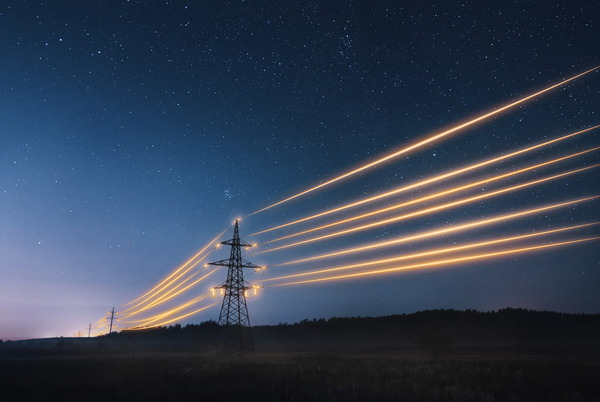Worldwide, there is gridlock on the grid—the network of power lines, cables, substations, and transformers that takes electricity around countries to power our homes, offices and factories.
And there is just not enough of this power, which opens a vast multi-trillion dollar investment opportunity. Let me explain…

Around the world, developers of renewable energy infrastructure have been told they must wait anything from several years in some parts of the U.S. to up to 15 years in other nations, before they can plug projects into grids.
In the U.S., grid connection requests grew by 40% in 2022, according to a study led by Lawrence Berkeley National Laboratory. The researchers discovered that nearly 2,000 gigawatts (GW) of solar, wind and energy storage projects were in queues to connect to transmission grids—the long-distance, high-voltage electricity network. That is far more than the installed capacity of the entire U.S. power plant fleet!
The Electric Grid Gridlock
Underneath all the political noise about renewable energy, few are talking about the electric grid, the infrastructure necessary for achieving ambitious climate targets and net-zero plans.
The reality is this: as the world moves to increased electrification, such as the switch to electric vehicles and heat pumps, we will need to transport more electricity than we ever did in the past.
At the moment, there is literally no country where the grid does not currently pose some level of obstacle to the energy transition away from fossil fuels. One of the major issues is that there is not enough grid infrastructure to meet the needs of the changing energy system.
BloombergNEF, a research provider, estimates that 80 million kilometers of new grid is needed by 2050 to replace the entire global electric grid, as it exists today. That’s nearly 50 million miles, or enough transmission lines to circle the Earth 2,000 times!
The researchers also estimate that at least $21.4 trillion needs to be invested in the electricity grid by 2050 to support a net-zero trajectory for the world. This total investment would be divided between $4.1 trillion to sustain the existing grid and $17.3 trillion to expand the grid for new electricity consumption and production.
Unfortunately, governments and industry are yet to take the electric grid problem seriously.
Data from the International Energy Agency (IEA) show that, rather than capital investment in grids globally increasing following the Paris agreement, it actually fell between 2017 to 2020. Investment only recovered to 2016 levels in 2022, at $330 billion.
Meanwhile, Irena says to keep the 1.5°C goal alive, global annual investment in power grids and so-called flexibility (energy storage, etc.) will need to hit almost $550 billion a year by 2030.
Add it all up and it is a huge investment opportunity for the companies involved in upgrading the electric grid. I believe it may end up being larger than even artificial intelligence.
Quanta Services
One such company poised to take advantage of this opportunity is one I told you about before: Quanta Services (PWR), which provides specialty contracting services and also designs, installs, and maintains the infrastructure and networks to the electric power industry as well as the oil and gas sectors.
Quanta’s stock is up more than 440% over the past three years—nearly 52% over the past year alone, and about 40% year-to-date. And, there is much more to come.
Quanta reports its results under three reportable divisions: Electric Power Infrastructure Solutions (52% of revenues in 2022), Underground Utility and Infrastructure Solutions (26%), and Renewable Energy Infrastructure Solutions (22%). The Renewable Energy Infrastructure Solutions segment was added primarily due to the $2.7 billion acquisition of Blattner in 2021.
The Electric Power Infrastructure Solutions business installs, repairs, and maintains electric power distribution networks and transmission lines. It also provides emergency restoration services, including the repair of infrastructure damaged by inclement weather, the energized installation, maintenance, and upgrade of electric power infrastructure and the installation of “smart grid” technologies on electric power networks.
The Underground Utility and Infrastructure Solutions division provides comprehensive infrastructure
solutions to customers involved in the development, transportation, storage, and processing of natural gas, oil, and other products. This segment’s services include pipeline protection, integrity testing, rehabilitation, and replacement as well as the fabrication of pipeline support systems and related structures and facilities for natural gas utilities and midstream companies, and it provides high-pressure and critical-path turnaround services to the downstream and midstream energy markets and instrumentation and electrical services, piping, fabrication, and storage tank services.
The Renewable Energy Infrastructure Solutions business offers services for renewable energy generation facilities, including wind and solar, as well as services performed for electric transmission, substation, battery storage, and related infrastructure that supports the delivery of renewable energy.
PWR Outlook
I expect to see Quanta Services experiencing revenue growth of 13% to 18% in 2023, supported by its renewable energy and electric power solutions businesses. Longer-term, the company is on a strong multi-year growth trajectory thanks to utility grid modernization and infrastructure hardening activity, with severe weather events potentially driving additional demand.
The investment research firm CFRA rates Quanta services a buy. Here is what its equity analyst Ana Garcia said about the company:
“Our Buy opinion reflects our view of rising demand for power transmission and electrification projects in the next few years as PWR provides skilled resources and technology. We forecast robust growth from utilities as we think the industry is in the early stages of a multi-decade modernization program to replace aging infrastructure. PWR is well positioned to benefit from federal infrastructure stimulus in the coming years, as significant funding is directed towards grid hardening and modernization project work.”
I am in total agreement. PWR stock has been hitting 52-week highs recently. It remains a strong buy anywhere around the $200 per share level, and as high as $220.





